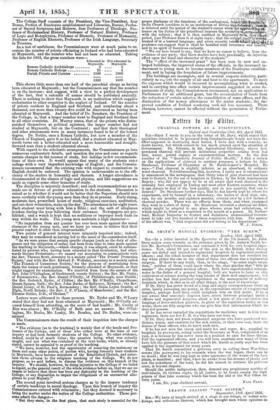frttrro to at hitnr.
CHARCOAL POWDER AS A DISINFECTANT. Oxford and Cambridge Club, 6th April 1855. Sin—Since I wrote to you on the letter of Dr. Davy, which stated that quicklime intended to be procured from Constantinople would not have the effect supposed in destroying dead bodies, I have met with a remedy, no doubt known, but which cannot be too much pressed upon the attention of Government. Dr. Johnson, in his Agricultural Chemistry, shows how powdered charcoal will prevent deleterious properties arising from bad diet, water, putrid organic or excrementitious matters. In the first number of the " Quarterly Journal of Public Health," I find a review on the applications of charcoal to sanitary purposes, a lecture by John Stenhouse, Professor of Chemistry at St. Bartholomew's Hospital. He says—" Peat charcoal is slightly inferior, as an absorbent, to ordinary wood charcoal. Notwithstanding this, however I lately saw it ostentatious- ly announced in the newspapers, that thirty ans of peat charcoal had been sent to Scutari, for the use of hospitals in Turkey, by the Irish Amelioration Society; who did not appear to be at all aware that wood charcoal is the ordinary fuel employed in Turkey and most other Eastern countries, where it can always be had of the best quality, and in any quantity that can be desired." Dr. Stenhouse further says, that he has known kept by others for experiment, and by himself in a laboratory, the bodies of dead dogs, cats, rats, for six months and eighteen months, covered over by a few inches of charcoal powder. There was no effluvia from them, and when examined they were in a state of decay. Dr. Stenhouse invented a charcoal air-filter, which might be adapted to any place whence arose bad exhalations, or which might be fitted as a respirator to the mouth of a person. Dr. Suther- land, Medical Inspector to Scutari and Balaklava, memorialized Govern- ment to take out five hundred of these respirators with him. The answer of the official was, " that respirators did not belong to his department." W. J. Elam.


























 Previous page
Previous page